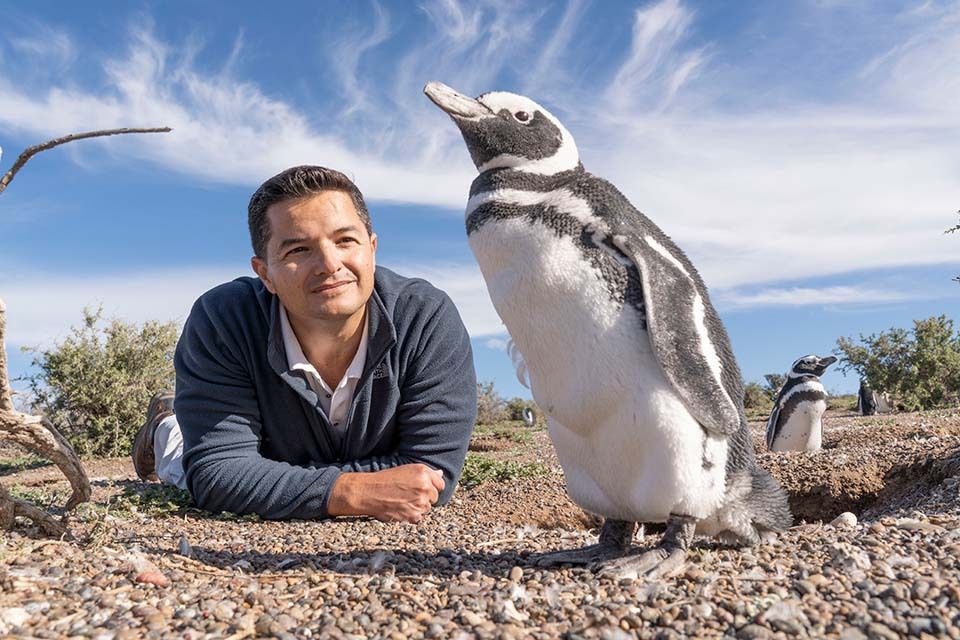Dr. Pablo Borboroglu is the winner of 2023 Indianapolis Prize. Photo courtesy of aza.org.
MAXWELL COLLINS | STAFF REPORTER | mcollins1@butler.edu
The Indianapolis Prize is the leading animal conservation award, allocating $250,000 every other year to a qualifying animal conservationist. The winner of the 2023 award was Dr. Pablo Borboroglu, who came to Schrott Center for the Arts as a speaker in the J. James Wood Lecture Series on Oct. 2. This lecture series focuses on science, technology, engineering and mathematics (STEM) topics with a goal to make STEM conversations more accessible to the greater Butler community. Every year, the Indianapolis Prize is announced, and the winner holds a lecture as a part of this series, free to the public.
“Penguins are my neighbors!” Borboroglu said to open his presentation. Growing up in Patagonia, Argentina gave him a unique childhood; when he was not doing homework, Borboroglu would save penguins from oil spills and rehabilitate them. As he entered adulthood, Borboroglu continued pursuing his penguin passion and decided he needed to do more to help the conservation of the species so near to his heart.
One person from Butler who attended the event was biology and biological sciences lecturer Dr. Hillary Madinger. For her master’s degree, Madinger worked with the critically endangered Devils Hole pupfish in Nevada.
“We have incredible pockets [such as Argentina’s Magellantic penguins, Nevada’s Devil Hole pupfish, etc.] around the world that are worth conserving,” Madinger said. “That requires cooperation from people around the world.”
While conservation may seem like an irrelevant issue to Indiana residents, both Borboroglu and Madinger agreed that “cute” animals are the gateway to getting people interested in conservation.
“A lot of conservationists are thinking about this in terms of … [protecting] the whole food web because you are protecting one species of interest to the public,” Madinger said. “There is a lot of compelling evidence that that is a strong approach to protect species.”
So, what can the Butler community do to protect endangered wildlife and their habitats? Zach Coulis, a senior environmental studies and biology double major, uses what he has learned through his time with Eco Reps to inform his everyday decisions.
“The way you live is important,” Coulis said. “[You are] voting with your dollar, [and] every time you purchase a product you are choosing to support that company. So being conscientious of the practices these companies have is really important.”
Coulis suggested some simpler ways students could keep sustainability — and in turn, conservation — in mind. For example, students can use products with eco-friendly packaging, replace aluminum foil with beeswax wraps or bring their own water bottle and cutlery to the dining hall, instead of plastic versions.
“Plastics are a global issue,” Borboroglu said in his lecture. “There are so many kinds of plastics. We find the plastics in the [penguin’s] nest, and [the penguins] even swallow small pieces.”
Indiana is a landlocked state, but Madinger assured that there are a lot of things to protect even on campus. Beautiful plants and animals do not only exist in Patagonia, where Borboroglu has been working with penguins all his life.
“There’s a lot of really incredible places that get overlooked in Indiana because people think this is a boring state, [but] there are cool things that you can find everywhere,” Madinger said. “On our campus we have a canal, a river and forests next to the bell tower, and the animals are finding all these places.”
The first step to helping conservationists protect endangered wildlife and their habitats is knowledge and advocacy.
“It feels a little challenging as a student or an everyday person to feel involved in conservation,” Coulis said. “The most effective way of promoting conservation in day-to-day life is advocating for organizations that are doing good work.”



